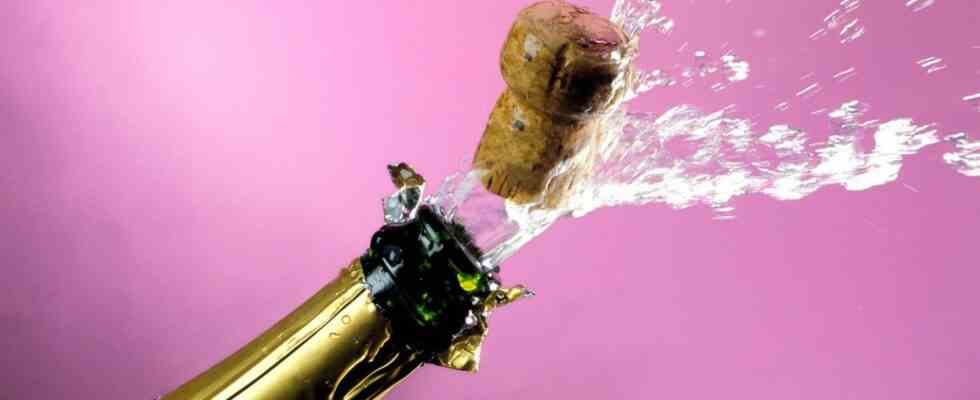Cheap sparkles better
Can non-alcoholic sparkling wine be fun? Ökotest has checked which really pop – two are flooded
Drinking champagne until you drop and still keeping a clear head, that’s even delicious.
© pidjoe / Getty Images
Sparkling wine without alcohol is great, it promises fun without a hangover. But does it taste good? Ökotest has popped the cork. Not all results are sparkling.
“You say ‘Cheers!’, you say ‘Cheers!’, I say ‘No thanks’. Tomorrow morning I’ll be a winner, but for the time being, now, tonight, the others are ahead, although they’re crowded around me around, but we’re still a long way off. You’ve got a lead of at least three glasses, and here’s another tray. No thanks. Do you have any water?” That’s how the little book “Sober on World No Tobacco Day” by Benjamin von Stuckrad-Barre begins. It’s about drinking, well, actually more about not drinking anymore and about the feeling that everyone knows who has had to or wanted to defy the friendly seducers with the champagne bottle with juice and soda.
Who refused the alcohol the glass, while everyone else happily romped behind the armor, had to explain to the party society – fun brake! Not anymore. When it comes to drinking culture, a turning point has long been heralded – so-called alcohol-free spirits, i.e. alcohol-free alternatives to gin and co, are increasingly conquering supermarket shelves and giving intoxicating enjoyment a new sexiness.
And even those who want to pop the corks, New Year’s Eve would be a good time, no longer have to put up with getting tipsy. Only which of the so-called non-alcoholic sparkling wines are really fun in a glass? Ökotest had its employees blind taste 20 sparkling wines without alcohol. The majority of the products (16) were produced on the basis of dealcoholized wine, four others on the basis of grape seed juice plus carbon dioxide.
Non-alcoholic sparkling wine for little money
The test shows that non-alcoholic sparkling wines can be a real alternative. The testers rated more than half of the products as good (7) or very good (6). The sensory experts had little to criticize in terms of taste. However, sparkling grape juices (rather sweet) are described as “more pleasant and rounder” than dealcoholized wines (rather dry).
One explanation for this could be the manufacturing process. To get the spirit out of the bottle, the wines are vacuum distilled, the alcohol evaporated. According to Ökotest, however, “part of the bouquet is lost” with it, which is why many manufacturers add additives such as (natural) flavors afterwards.
Beautiful: High-quality non-alcoholic sparkling wine enjoyment is not a question of budget. “Very good” alcohol-free wines are also available from discounters. “Burg Schöneck” from Lidl and “Schloss Königstein Weiss” from Edeka cost just under two euros. The cheapest sparkling wine based on grape juice is “Trenz Trenzero” (5.79 euros). However, the testers were not very happy about what was in the bottles of the two most expensive sparkling wine alternatives.
“Sober is sexy”
Enjoyment without a hangover: These delicious cocktails are completely alcohol-free
“Zéra Profil Chardonnay Effervescent” costs 7.29 euros per bottle. But then you get, among other things, “artificial, candy and perfume-like” notes in the glass. The testers did not find that exciting, but “insufficient”. The trunk rattles through the test. The most expensive sparkling wine did not fare much better in the test. A crisp 12.99 euros has to be paid if you want to pour the “Kolonne Null, Cuvée Blanc No.1”, but according to the Ökotest you also get “traces of two particularly questionable pesticides” in the glass. The bottom line is that the alcohol-free only gets a “poor” and thus the second-worst result in the test.
Alcohol in non-alcoholic sparkling wines
By the way: If you take it exactly, there is of course no such thing as non-alcoholic sparkling wine. On the one hand, because the term is protected. On the other hand, because there is always alcohol in the bottle, albeit sometimes in almost homeopathic amounts, even though the label says alcohol-free, dealcoholized or simple grape juice. The permitted alcohol content ranges between 0.04 and 1 percent alcohol by volume. According to the Ökotest, all tested products comply with these limit values, but the testers advise pregnant women to “continue drinking non-alcoholic sparkling wine”.



